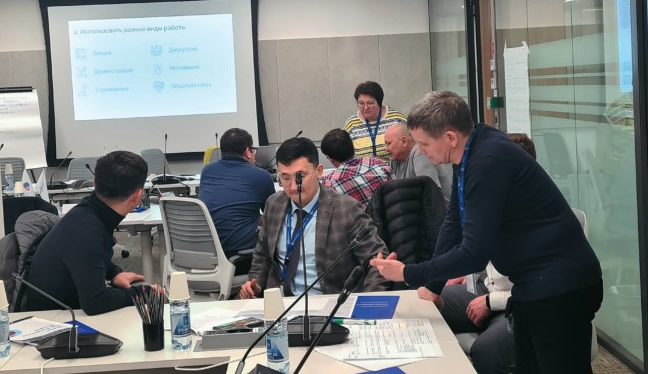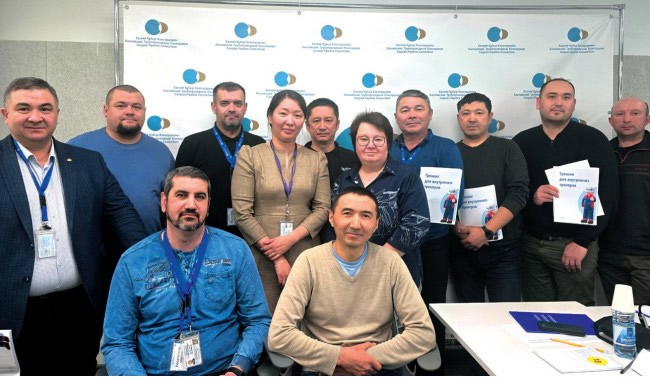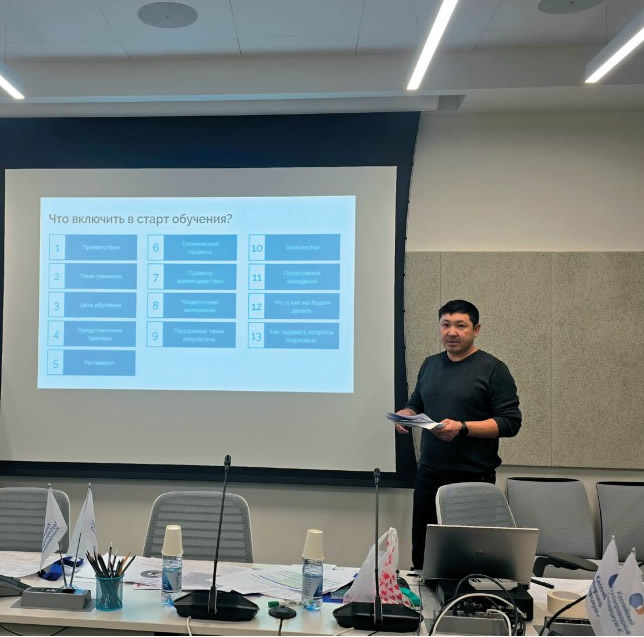Atyrau Oil & Gas
Internal Trainers – An Effective Form of Professional Training. The Experience of CPC-K

What associations come to mind when you hear the word "training"? A university department, a spacious training center auditorium, or a computer monitor with an online course?
For most of us, it's associated with a traditional educational institution, but is such a form of training always the most effective? After all, once a course is completed, the instructor often cannot answer participants' questions, and the schedules of training centers don't always align with the busy timetables of employees.
External training is not always effective, especially when it comes to processes and procedures specifically designed or adapted for a manufacturing company.
The answer to all these questions is internal training – courses developed and conducted directly by company employees. After all, it is the employees who know the specifics of the equipment, production, and other operational processes better than anyone else.
This is why, at the Caspian Pipeline Consortium, there has been an "internal trainers" institute for many years, assuming that experienced functional experts pass on their knowledge to colleagues in a cascading internal training format. Alexandra Sergeevna Rabinovich, the head of the training and development department (training manager) at CPC, explains who these internal trainers are and how they help employees enhance their professional competencies.
During the implementation of the CPC Expansion Project, with the modernization and construction of new facilities, serious training of personnel to work with new equipment and technologies was needed, and internal trainers provided invaluable assistance in personnel preparation: several programs on new equipment were carried out specifically by internal trainers, who possess invaluable work experience and specialized knowledge.

Now, internal training programs are also actively used as part of the initial preparation system: newly hired or employees transferred to a new position undergo internal training on working with equipment, developed taking into account the specifications and experience characteristics specifically for our company. From 2021 to 2023, 252 employees of CPC-K were trained by internal trainers.
Over the years of the internal training process at CPC, 88 internal training programs have been developed and adapted for the operation and technical maintenance of mainline pump units, booster pumps, fire extinguishing systems, uninterruptible power supplies, and many other types of equipment.
Since the inception of internal training at CPC, 88 internal training programs have been developed and adapted for the operation and technical maintenance of mainline pump units, booster pumps, fire suppression systems, uninterrupted power supply sources, and many other types of equipment.
When developing the programs and instructional materials, job requirements are considered. Thus, for a single type of equipment, internal training programs may be devised for various positions and working specialties: instrument and control technicians, electricians, engineering and technical workers–taking into account the scope of employees' functional tasks.

One of the most significant programs is the initial training program for shift supervisors. Upon appointment, the shift supervisors at pump stations travel to the Main Control Center in Novorossiysk, where a two-week program on the principles of dispatch management and SCADA system operation is conducted for shift supervisors from all CPC regions. They also undertake practical exercises on simulators to manage emergencies. Three years later, shift supervisors undergo a five-day course on the safe operation of the oil pipeline system's equipment.
Employees developed these unique courses from several CPC departments and have been successfully employed for many years.
Digital technologies are actively utilized in implementing internal training programs. The Training and Development Portal provides information about existing programs, internal trainers, and training materials to all company employees. Employees who need to refresh their knowledge after training can access the portal and retrieve the necessary information.
The testing process is also automated: after completing internal training, employees take an exit test on the Training and Development Portal, and after three months, they are automatically assigned a retest to ensure knowledge retention. The results are analyzed by the Training and Development Department, discussed with internal trainers, and serve as the basis for program adjustments when necessary.
The company extensively adopts the development of e-courses and their use for employee learning through the Training and Development Portal.
As of March 2024, there are 59 internal trainers at CPC-K.
Who are these internal trainers? They are employees with unique knowledge and experience in a certain field who can transfer knowledge to their colleagues and answer their questions.
"Our company's internal trainers are primarily functional experts for whom training colleagues is not the main area of expertise," explains Alexandra Rabinovich. "But functional knowledge alone is not enough to develop and conduct training–it's important to compile a structured program, consider adult learning peculiarities, and create clear and illustrative materials and tests to determine the actual level of knowledge acquired."

To assist internal trainers, the Training and Development Department has developed a thematic section on the Training and Development Portal for them, which includes materials for training preparation and delivery and test development. In March 2024, face-to-face training for trainers was conducted to help them enhance their teaching skills.
Internal training is not just about every day; it's also about celebration: in December 2023, a festive event took place at the CPC regional offices–awarding the best internal trainers in the regions and selecting the best CPC trainer.
The best trainers were selected in each region. Criteria for the awards included feedback from training participants, the number of employees trained, and the programs developed.
The regional leadership conducted the award ceremony in a formal setting. The winners received commemorative souvenirs and prizes, and the top trainers in the regions were given certificates for in-person trainer skill courses.
The CPC Training and Development Department plans to develop the direction of internal training further: to introduce new formats (including blended learning), to continue working with internal trainers, and to expand the list of programs through which employees can enhance their knowledge with the help of internal experts.



